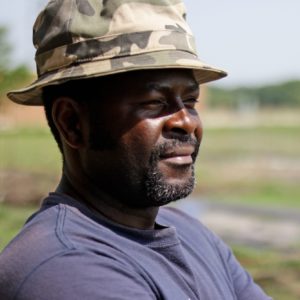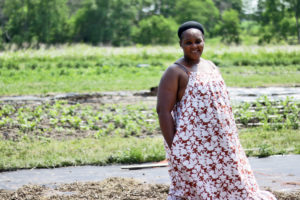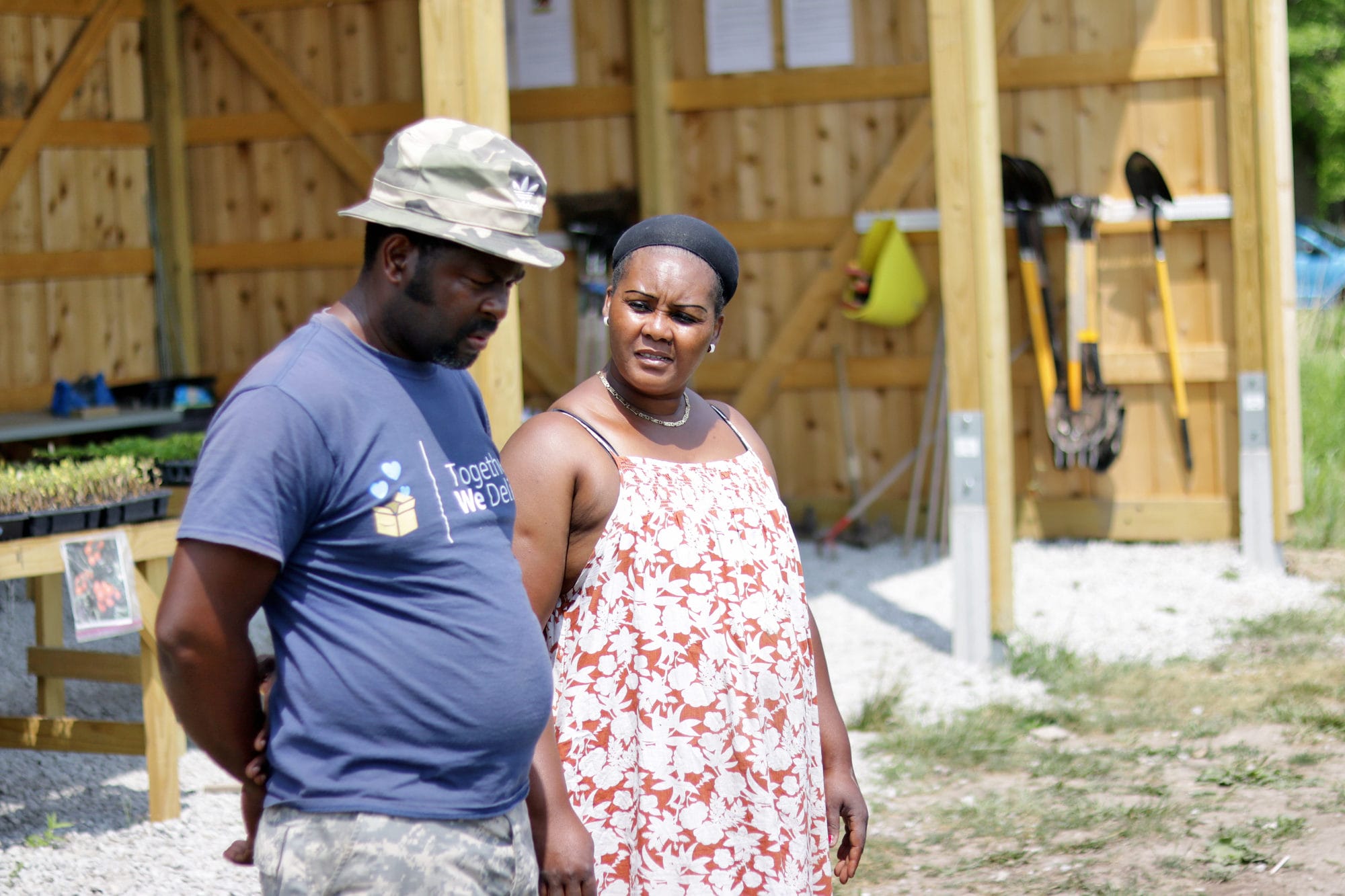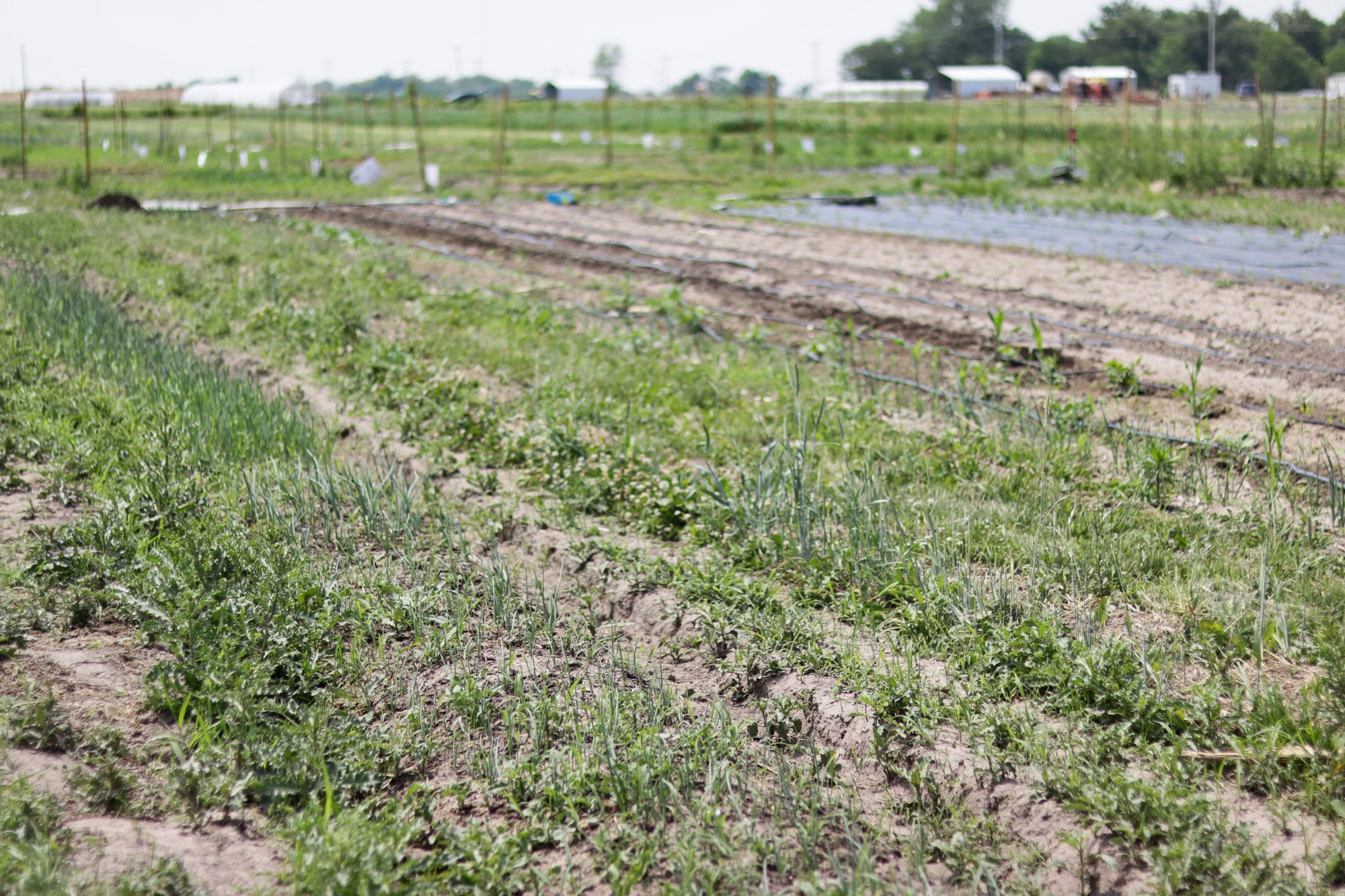Thinking Globally, Growing Locally
Global Food Project’s incubator farm helps immigrants to Iowa City build community while preserving cultural ties and traditions
It’s a sunny day at the Global Food Project gardens in Iowa City, Iowa, and Emmanuel Gauthier Mfuankatu is showing off the plot of land where, for the past two years, he has been raising food following Congolese traditions. “Here, I am learning, and I am teaching, using my body and being in the natural world,” Emmanuel says.
Originally from the town of Mbanza-Ngungu in Congo Kinshasa, a name often used to refer to the Democratic Republic of Congo, he immigrated to Iowa City in 2016. In Congo, he earned a bachelor’s degree in history and social science – and his love of history and community is evident in the way he grows food. “Everything I am doing here I learned in my home country,” he says.
Emmanuel’s mother, Marie Sungudulu Lukenga, spent her days farming a couple of hours outside of Kinshasa, Congo’s capital city. She grew nearly all her family’s produce, sold produce at market and taught her son how to farm the Congolese way. Emmanuel now happily shares the legacy of his mother’s wisdom with his community at Global Food Project.
The project was founded in 2016 by a group of Iowa City residents who believed that sharing space to grow food could help build community between newly arrived and established residents, and thus “to make a more inclusive and interconnected Iowa City.” To work towards this goal, Global Food Project leases land from the Johnson County Historic Poor Farm and divides that land into plots for interested growers.
In its first years, the effort was managed entirely by citizens who believed in the project’s mission. Interest in the plots quickly grew, and by 2020, it was clear more resources and management were needed. Iowa City Compassion, a nonprofit offering immigration and legal services, took over the task and in 2021 hired a manager to oversee the garden space, assist growers and manage demand. As of the 2023 growing season, 55 families farm at GFP. Most are new arrivals to Iowa from Congo, Sudan, Mexico and Central American nations, among others.
As an incubator space, GFP provides these growers with water, tools, plants, education and access to a pack shed and greenhouse. Two types of plots are available: a 13-by-30-foot family plot and a one-tenth-acre market plot (about 33 feet by 132 feet). If farmers want to expand, they are welcome to apply for half-acre plots, available for three-year leases, through the Land Access Program housed on Johnson County Historic Poor Farm.
Spreading the Word
Back at Emmanuel’s plot, that sunny day found him troubleshooting with another Congolese grower, Blandine Matondo, a young woman in the midst of her first growing season at GFP. She raises spinach, cucumbers, peppers, onions and sour leaf, which are young leaves from the native African roselle plant that are used in a range of traditional recipes. “It’s like spinach with a sour taste,” Blandine explains. “We cook it with meat.”
As we walk to her garden, her face lights up as she tells us, “This is an experiment.” Her entire plot is divided into six smaller square plots by trenches about 6 inches deep. “If you need to remove weeds, you need somewhere to stand,” Emmanuel explains, pointing to the trench. “You won’t crush your food with your feet. If it rains or if you put water in it, [the moisture] can stay in that space and put humidity in the soil.”
Blandine learned about Global Food Project from Emmanuel last year when he shared his bounty with her and some other African immigrant families. He recalls what he told them. “I said, ‘Hey, this year I will bring you food,” Emmanuel recalls. “But next year you grow your own food.’” Blandine and four other Congolese families now have their own vegetable plots at GFP.
Will Kapp, an Iowa City local, started as the organization’s manager in 2021. Early in his career, Will worked on a variety of farms across the country until concluding that farming full-time wasn’t possible. “I didn’t have family land, there was no money in my family and I was not making any money at all,” Will recalls. “I was thinking ‘I really love this,’ but I didn’t feel like there was a viable path for me. So I changed gears, went back to school, got a teaching license and came back home to Iowa City.”
Will taught eighth grade language arts at Northwest Junior High School in Iowa City. “I wasn’t aware of the number of immigrants in the area until I started teaching at Northwest,” he says. “I got to know all these students from Sudanese families and other families from Africa. I was really excited to meet all of these kids from all over the world. When this opportunity came up to do a garden program with people from all over the world in Iowa City, I was immediately interested.”
In the short time Will has managed Global Food Project, interest in the program has soared. “The gardens were very small the first year I was involved,” Will says. “We had 35 gardens set up and about 20 were used by around 12 families to garden throughout the year. We have 92 gardens this year and still every day, we are getting more demand.” A big part of the growth is due to word of mouth – growers at GFP have been spreading the word to community groups and peers. This year, about 25 families are in their first growing season at GFP.
Finding a Home Through Gardening
Emmanuel also learned about GFP through word of mouth – he started farming there in 2021 after learning about the project through a community group. Despite his farming upbringing, he says his first year growing crops in Iowa felt tentative. “It was a test for me,” he says. “I don’t know what I can plant here. In Africa, we don’t have snow. In [Congo], you can grow all year, but here we have a short time. I don’t know how the soil is. I tested eggplant, tomatoes, onions, okra, cucumber. I was coming here every day checking on my garden.” He’s learned more about farming in Iowa, but still visits his plot nearly every day after his workday ends at a local Amazon warehouse.
“When I am [at Global Food Project], I think of home because everyone at home has a garden and grows food this way,” Emmanuel says. “Last year, we were less than 10 African families. Now we are more than 30. It is very important. It means we didn’t forget our habit and culture and how to make our food.” He contrasts this with what he has observed in the United States, where he says people “have only one knowledge for one thing, for one orientation.”
“That is the difference from [Congo],” he continues. “Most parents teach you everything. You go to school, but you have to know how to sell something. You have to know how to grow your own vegetables. When you have a break [from school] for one or two months, you go to the garage and learn mechanics.” Emmanuel’s philosophy of life, along with his diversity in thought, enterprise and education, bring a valuable perspective to our monoculture state.
He embodies his words by showing up for his garden and community, and his willingness to so freely share his outlook and experience. Emmanuel’s family name, Mfuankatu, means eternal life. Looking at what has grown from his garden at Global Food Project, it seems that Emmanuel’s investment in his community and Congolese traditions has a life eternal. It is a never-ending, branching, replicating form of care that lives on from generation to generation – a system where knowledge is passed from one to another, where food sustains a culture away from home and where a culture sustains the practice and knowledge of growing food from the home country.
Global Food Project has provided a much-needed landing space for growers with food philosophies and knowledge from all over the world. As Will puts it: “Often the public-facing information about GFP is that we are looking at land access, culturally relevant food and food insecurity. If you went up to any gardener here and asked them about those things, more of them would say that [GFP] is an outdoor space they feel comfortable in, that they can take their family to, that they have ownership and agency over. I think for a lot of folks who aren’t established Iowans, and who aren’t white, those spaces are hard to find.”
Emmanuel, Blandine and Will – and all the farmers growing at Global Food Project – help reveal the diversity inherent to agriculture, and why it’s vital that we ensure everyone who wishes to farm can do so. We have so much to gain and learn from growers who were taught outside of our system of agriculture – not just their farming methods, but their stories, too.
Because elsewhere, just as in Iowa, our stories, our farms and our food are inseparably linked.




